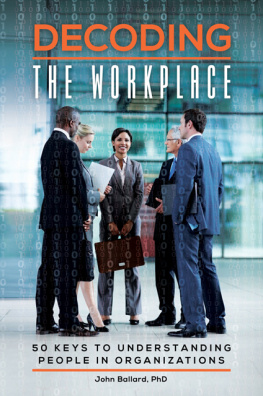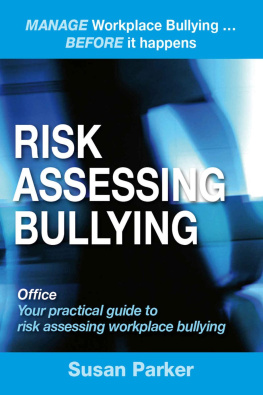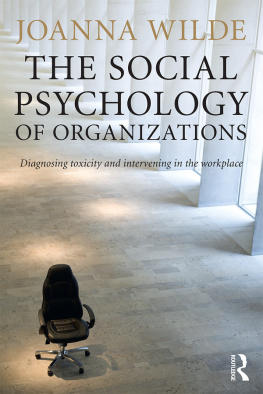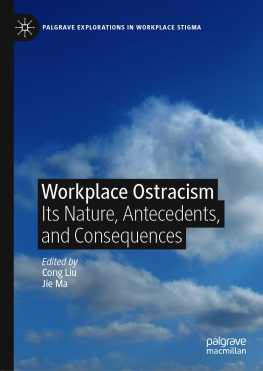

Copyright 2015 by John Ballard, PhD
All rights reserved. No part of this publication may be reproduced, stored in a retrieval system, or transmitted, in any form or by any means, electronic, mechanical, photocopying, recording, or otherwise, except for the inclusion of brief quotations in a review, without prior permission in writing from the publisher.
Library of Congress Cataloging-in-Publication Data
Ballard, John (Professor)
Decoding the workplace : 50 keys to understanding people in organizations / John Ballard, PhD.
pages cm
Includes bibliographical references and index.
ISBN 978-1-4408-3826-2 (alk. paper) ISBN 978-1-4408-3827-9 (ebook) 1. Organizational behavior. 2. Corporate culture. 3. Psychology, Industrial. I. Title.
HD58.7.B353 2015
302.3'5dc23 2015001793
ISBN: 978-1-4408-3826-2
EISBN: 978-1-4408-3827-9
19 18 17 16 15 1 2 3 4 5
This book is also available on the World Wide Web as an eBook.
Visit www.abc-clio.com for details.
Praeger
An Imprint of ABC-CLIO, LLC
ABC-CLIO, LLC
130 Cremona Drive, P.O. Box 1911
Santa Barbara, California 93116-1911
This book is printed on acid-free paper 
Manufactured in the United States of America
To
My darling Emily, my wife,
who grounds my life
and makes all things possible
And to our grandchildren
Justine, Jackson, Allison, Calvin
whom we deeply love and cherish
Contents
Preface
It was the grand opening of a business in a new and bigger location. The owner was very successful. He had significantly grown his business. Tonight was a special night for regular customers and old friends. Shortly after I arrived, the owner noticed me and motioned for me to join him.
Good evening, I said, Very impressive. You have done well.
Without blinking an eye, he replied, I could not have done it without you. In many ways you are a big part of my success.
Greatly surprised, I muttered, Not really. Surely not. You have done this. He raised his hand and stopped me.
But you taught me lots of little things that have made all the differencehow to think about what I do, how to understand people, how to treat my employees. No, I would not be here tonight but for the good advice you have shared across the years.
I thanked him and moved along.
In this book is much of that advice.
Would you like:
a better understanding of the workplace around you;
a better understanding of others;
a better understanding of yourself;
ideas to improve your effectiveness; and
ideas to improve your decision making in the daily business of the workplace?
Or perhaps you know someone who would. I offer no guarantees, but my experience is that there are insights in these pages that will benefit many people.
I am a university professor who teaches management and behavior in organizations. I am also a former manager and consultant with decades of practical experience. For many years, students in my coursesespecially the graduate students who were managers in the real worldhave suggested that I write a book, a book that would capture what we discuss in class. Such were the origins of this volume.
I have been studying management for a lifetime. I know the scholarly literature on leading, managing, and behavior in the workplace. I also know the school of hard knocks, and how ideas are translated or fail to be translated. Management books for the masses tend to be written mostly by successful business people and consultants. With some notable exceptions, such as Rosabeth Moss Kanter and John Kotter, most professors are more likely to write for other business professors. Too frequently academic books by professors are hard to read and difficult to apply to the real world. Conversely, some management trade books would benefit from a firmer foundation in the scientific research on what we know about people, leading, and managing. Stephen Robbins wrote in The Truth About Managing People, Much of it [management advice from these books] is a gross generalization, ambiguous, inconsistent, or superficial. Some of it is even downright wrong.
My favorite management philosopher lived over 100 years ago. In the 1920s Mary Follett, often called the prophet of management, wrote that stories and examples are essential to learning how to lead and understand others. I totally agree. I find that stories and anecdotes derived from organizational life clarify concepts and make the concepts easier to remember.
To illustrate the concepts and ideas in the chapters that follow, I have shared from my work and life experiences. I also have used short stories or vignettescreations and composites from life in the workplace. Any similarities to specific people or organizations are unintentional. Because most of these examples represent common organizational experiences, you could find them very similar to situations with which you are familiar. You might say to yourself, Ive seen that or something like that happened just the other week. Reflecting on your own experiences will move you closer to decoding your workplace.
As college and university professors, we are taught to focus on detailed research studies published in scholarly journals. We question the limits to which we can apply the results of our studies to other situations. We sort through results of research studies to validate theories. To some academicians my presentation of theory and research at times could seem overly simplified. To echo Douglas McGregor, professor and author of the 1960s best-selling management book, The Human Side of Enterprise:
If all of the qualifications which would be required by a truly adequate treatment were introduced, the gross essentials which are particularly significant
Human behavior is very complex. This book focuses on essentials to help you understand the workplace, the concepts I consider to be essential to understanding yourself and others. I present them from my perspective, as seen through my lensas a management scholar and as a manager and consultant. This book is not a primer on management or organizational behavior per se. There are many excellent academic books that do that. My objective is to put concepts from the management and organizational behavior literature in easy-to-understand terms and illustrate using stories and examples. In this book are meaningful ideas that can help readers decode the workplace and navigate their work lives. My hope is that somewhere in these pages you will find some idea, some concept, some insight that will make your life a little better.
Part I: First Thoughts
CHAPTER ONE
Using Keys to Decode
the Workplace
Laura had only been in her new job a few weeks. It was her first real job, the first since she graduated from college. She was very glad to be employed. Her entry-level position was in a nice office setting. But there were things she did not understand. Why did people who were not her boss keep telling her how they expected her to do her job? Why did people keep going to Steve for advice? He wasnt even a manager. And why did her immediate supervisor, Kelly Lorre, talk with her about how to dress for the office. She didnt think her skirt was too short or that she showed too much cleavage. That didnt have anything to do with her job anyway.
Marcus had been in the same job, the same position, for 12 years. He did a fine job, better than most people, even if he did say so himself, and he often did. Sure he had a few small performance bonuses but the big promotions, those that could move him to higher levels in the company, always evaded him. The last promotion went to Amber Conti, a truckler if there ever were one. Every time you turned around, she was sucking up to the bosses. It made Marcus wonder what you have to do to get ahead.
Next page









